Science and the US Government
Air Date: Week of April 4, 2025
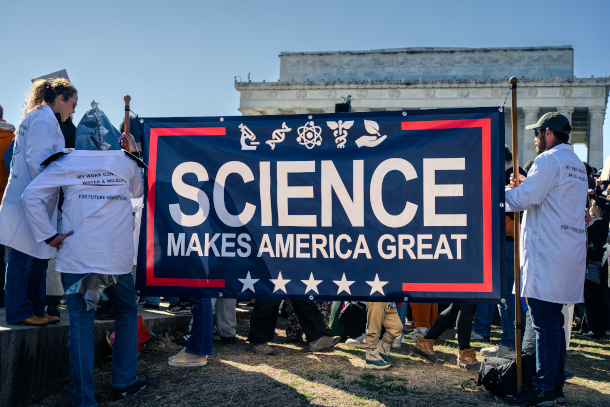
The Trump administration has so far cut tens of thousands of jobs from over two dozen federal agencies, including many dedicated to science. The “Stand Up for Science” rallies have protested these cuts. Shown here is the D.C. rally held on March 7, 2025. (Photo: Geoff Livingston, Flickr, CC BY 2.0)
The Trump administration is slashing personnel and research grants at two dozen federal agencies, including those conducting critical science. Science has long played a key role in the federal government, and Naomi Oreskes, a Professor of the History of Science at Harvard, joins Host Steve Curwood to put the recent changes into historical context.
Transcript
CURWOOD: A lot more scientific research is needed before forecasters can predict the power and paths of tornadoes days in advance, the way the public gets warned days ahead about hurricanes, but tornado science is just one avenue of research now endangered by the Trump Administration. The president and his people are slashing personnel and research grants at two dozen federal agencies, including ones conducting critical science. The National Oceanic and Atmospheric Administration or NOAA and the National Science Foundation lead federal climate and weather research and already 10% of their staffs have been fired. Science to support human health is also getting cut with 10,000 layoffs underway at the Department of Health and Human Services or HHS. And many of their grants have been paused or rescinded, including $12 billion to help states track infectious diseases and other health issues. On March 31, over 1900 researchers signed an open letter to the American people calling for the Trump administration to “cease its wholesale assault on U.S. science” and for the public to join its plea. For some historical context, we turn now to Naomi Oreskes, professor of the History of Science at Harvard University. With Erik Conway, she coauthored the 2010 book Merchants of Doubt: How a Handful of Scientists Obscured the Truth on Issues from Tobacco Smoke to Global Warming and the 2023 book The Big Myth: How American Business Taught Us to Loathe Government and Love the Free Market. Welcome back to Living on Earth, Naomi!
ORESKES: Thank you. It's always a pleasure to be with you.
CURWOOD: Professor, you're an historian of science. So when did this question of science's role in the US federal government first arise here?
ORESKES: Right from the beginning. So we know there were actually big arguments during the early years when the founding fathers were thinking about the new government, and there was actually a fairly spirited debate about whether or not there should be a science department in the new government. And Thomas Jefferson really wanted that, but many of his colleagues didn't, because they felt that science was an elite activity that should be sponsored and funded by societies like the American Philosophical Society, which already existed and it wasn't a function for government. But interestingly, even though Jefferson lost that debate, very quickly, within just a few years, people began to realize that the new government needed science.
CURWOOD: So what was the catalyst for creating the first few federal scientific agencies when they did come along, and what were their functions?
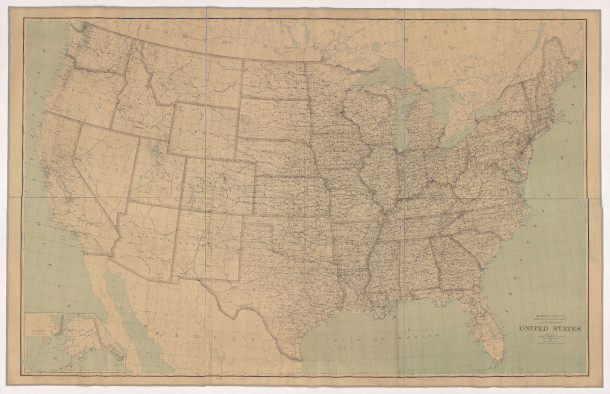
The first federal scientific agency, the US Geological Survey, was established in 1807 to create accurate maps. The above map was published by the agency in 1890. (Photo: Bibliothèque nationale de France, Wikimedia Commons, Public domain)
ORESKES: The first federal scientific agency was the US Coast Survey, later renamed the US Coast and Geodetic Survey. Thomas Jefferson was still president in 1807. And its function was to make accurate maps of the coastline because people quickly realized that you need science for commerce, because you need accurate maps. And shipping, of course, was the most important way that goods came in and out of the country. And so if you didn't have accurate maps of the coast, ships would wreck, and huge amounts of material would be lost, lives would be lost. And people realized it was actually impossible to have an economy without accurate maps, and it was impossible to have accurate maps without science.
CURWOOD: So fast forward to the 1970s, we saw, really, I think, an explosion in the establishment of several landmark scientific agencies. I'm thinking of the Environmental Protection Agency, the National Oceanic and Atmospheric Administration. What was going on politically and socially at that historical moment to kind of push our government in the direction of paying more attention to science?
ORESKES: Well, I'd say the short answer was the rise of the environmental movement and the increasing recognition that industrial activity did damage, did damage to the environment, did damage to species, like DDT killing the bald eagle, and also hurt people, damaged people's health. And so as the scientific evidence for physical, emotional, mental and health harms from industrial activity got stronger and stronger, there was more and more push to create agencies that would deal with those harms. And the Environmental Protection Agency, of course, is the most famous and most important and a big part of that story involves DDT. So after Rachel Carson wrote Silent Spring, that book got a lot of attention, both popular attention, but also political attention. We know President John Kennedy talked about the book. So Carson showed that DDT and other persistent pesticides were doing very radical harm to the bald eagle, to other birds, to fish, that she wrote that book based on extensive scientific work that had already been done by government scientists, particularly scientists in the US Fish and Wildlife Service, and also scientists in state Fish and Game agencies. What she really did was to compile all that diverse data, put it together in a powerful, well written story. Got a lot of attention for it, and especially this recognition that DDT was killing the bald eagle, the symbol of this country, not the turkey, which we know Ben Franklin wanted, that and the potential for harm to people was really galvanizing. And so the environmental protection agency was created to look into the science regarding harms, like the harms created by pesticides, and to create a foundation for rational regulation of dangerous materials in the environment.
CURWOOD: And of course, you get Earth Day in 1970 with fire on a river outside of Cleveland, the Cuyahoga River fire. To what extent did that help catalyze the federal government's interest in science because I think the man who actually is president when the EPA is formed is Richard Nixon.
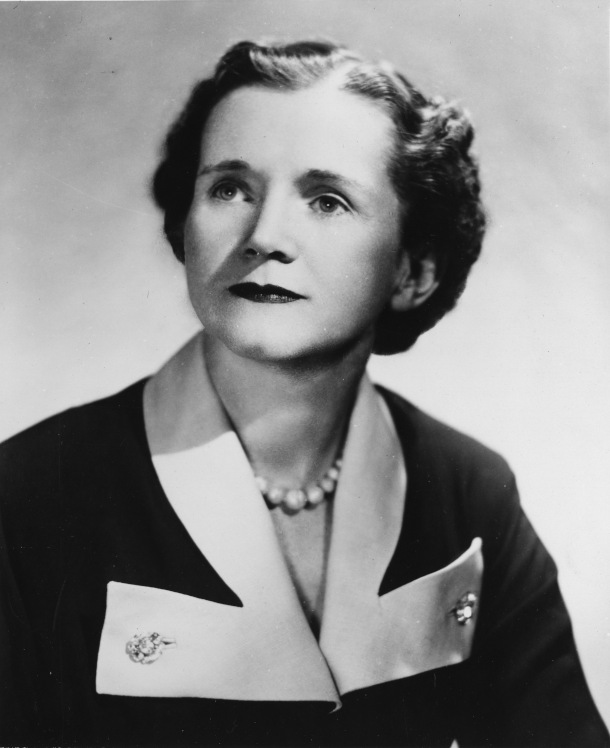
The 1962 publication of Rachel Carson’s Silent Spring, which documented the hazards of DDT, galvanized the public to demand more protection from industrial activity. (Photo: GPA Photo Archive, CC BY 2.0)
ORESKES: It shows how much our politics have changed. So in addition to the DDT story, there were a number of additional galvanizing events in the 1950s and 60s. One was the Cuyahoga River, which, as you just mentioned, caught fire. There was also the thermal inversion in the town of Donora, Pennsylvania, where I believe it was thousands of people, residents, including children, were killed when toxic air pollution settled on the town. And then there was also the smog in Los Angeles and in London. And again, people literally dropped dead in the streets during the London smogs and the fact that people were dying in real time. So this wasn't just the possibility of cancer that might kill you 20, 30, 40, years later, but this was people dying acute injury from air pollution. And so these different events in different places across the United States and the world were really galvanizing for people to say, no, it's not okay for companies to just dump toxic pollution in rivers, in lakes, in the atmosphere and kill people. And so you saw increasing bipartisan political support, so much so that, as you say, Richard Nixon, who was not a great environmentalist, but recognized that pollution was a really important issue to the American people, that the American people wanted this, and so he signed the legislation that created the Environmental Protection Agency.
CURWOOD: So what happened? Why did federal scientific agencies slip from being bipartisan deals to being very partisan deals?
ORESKES: The short answer is industry pushback and industry disinformation. So almost as soon as the ink is dry on the National Environmental Protection Act, which created the EPA, there's pushback from industry, and industry begins to argue, the country is becoming over regulated. You know, we can't operate. This is going to kill our businesses. And so they begin to organize in a number of different ways. One of the things that you may have heard of is the so-called Powell memo. The idea was to galvanize the business community to fight back against environmental regulation or any other regulation that they felt tied their hands. So it included regulations about labor laws, workplace safety. And so you see this building hostility towards government regulation of the workplace, government regulation of pollution, which then becomes increasingly expressed as an attack on the science that explains the need. And we see that really take hold in a big way with the election of Ronald Reagan. It's in the Reagan administration where we first begin to see organized resistance to scientific evidence that proves that something is doing real harm, and therefore that it might be reasonable to regulate that substance or that activity.
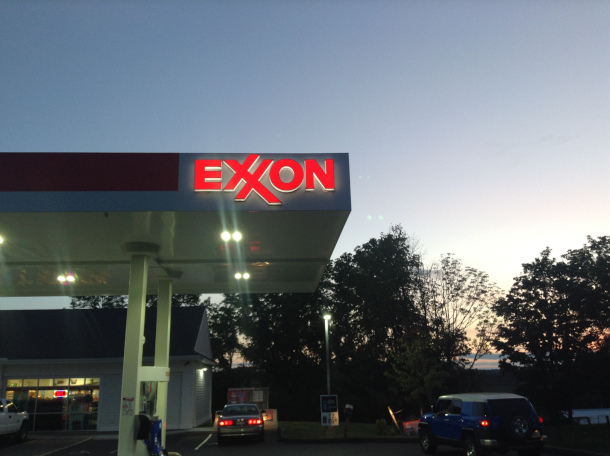
In the 1970s and 80s, Exxon Mobil’s own scientists warned the company about the consequences of burning fossil fuels. In response, Exxon, along with many other fossil fuel companies, engaged in disinformation campaigns to discredit climate science. (Photo: Mike Mozart, Flickr, CC BY 2.0)
CURWOOD: So this is the same period of time, Professor, that Exxon's own scientists were telling the company that, guess what, burning this fossil fuel is going to warm the planet in really uncomfortable ways. Hmm. So business learns that this is not good for the planet, but yet they push the political process to make it okay for them to go ahead and ignore the science? It feels like I'm reading this wrong.
ORESKES: No, I'm sad to say you're reading it exactly right. The evidence is quite overwhelming that we know that when we look at the climate change issue specifically, but other issues as well, that in the 1960s, 70s, and well into the 1980s, the American fossil fuel industry, and actually the fossil fuel industry overseas as well, was quite well aware of the emerging scientific evidence that burning fossil fuels produces greenhouse gasses, particularly carbon dioxide, that these gasses heat the atmosphere, and by heating the atmosphere, they heat the planet, and that in time, the planet would heat up and this would have really serious consequences. We know that one company in particular, ExxonMobil, even had a large research program in the 1970s and 80s to investigate this more closely. And we know that their own scientists not only did excellent, high quality scientific work, which in a few cases, they published in peer reviewed journals, but we also know that those scientists informed their managers about this problem, and in some of their reports and memos, they even say that this could be potentially catastrophic. And here's the really, you know, what I see as almost Shakespearean tragedy, because of the stakes were so high that the company made a decision around the late 1980s to stop doing science and to start funding disinformation.
CURWOOD: There's a scientific issue that comes up in this period of time around tobacco and its deleterious effect on human health, and you've written a fair amount about that. What did America's experience with tobacco tell you in terms of how we went so far down that dark hole of having people smoke, and how hard it was to dig us out of that? But it was done.
ORESKES: It was, but it was very hard, and it took a very long time. As you say, one of the things I've worked on is the history of the role of the tobacco industry in denying scientific evidence and attacking science and fostering public distrust of science broadly as a means to try to protect its product, tobacco, from regulation or even bans. What we saw in the tobacco story, and then again, more recently, in the fossil fuel story, is that there are corporations that are so committed to the profits that they make that they will defend their product even in the face of overwhelming scientific evidence that these products are doing huge harm. And in the case of tobacco, even though everyone knows the tobacco story, I think many people still don't really quite realize how incredibly harmful this whole industry was. So the World Health Organization has recently estimated how many people died in the 20th century from diseases caused by tobacco use. And the number is 100 million. 100 million.
CURWOOD: Uh, that's a big number.

The tobacco industry denied scientific evidence to protect its product. (Photo: Philip Morris Company, Wikimedia Commons, Public Domain)
ORESKES: That is a big number, more than died in all the world wars in the 20th century. I mean, just for comparison, something, over a million people died here in the United States from COVID. And think about how the COVID pandemic upended our lives. And this is 100 times that.
CURWOOD: We’re speaking with Naomi Oreskes, professor of the History of Science at Harvard University, and we’ll be back in a moment with more from our conversation. Stay tuned to Living on Earth!
[MUSIC: Floodplain, “Twilight” Single, Floodplain]
ANNOUNCER: Support for Living on Earth comes from Friends of Smeagull the Seagull and Smeagull’s Guide to Wildlife. It’s all about the wildlife right next door to you! That’s Smeagull, S - M - E - A - G - U - L - L, SmeagullGuide.org.
[CUTAWAY MUSIC: Floodplain, “Twilight” Single, Floodplain]
DOERING: It’s Living on Earth, I’m Jenni Doering.
CURWOOD: And I’m Steve Curwood. We’re back now with Naomi Oreskes, professor of the History of Science at Harvard University.
CURWOOD: So Naomi, we're talking to you today because many people have been, in some cases, shocked by the ways in which the Trump administration has undermined science and its role in our government. So give us an historical perspective. To what extent are the Trump administration's attacks on science unprecedented? Which actions are really setting up the loudest alarm bells for you, and which feel more like parts of you know, a predictable political cycle?
ORESKES: Well, it's a tricky question, because I think, as you just suggested, it's both and. So there have been questions about the role of science in the federal government, as we started this conversation, right from the very beginning of the nation. And certainly in the 19th century, as we saw the expansion of federal science, the creation of additional scientific agencies like the US Geological Survey, there were always questions raised about, is this an appropriate use of taxpayer money? Is this an appropriate federal function? And there have been times when people have pushed back and said, no, this is going too far. But I would say that in the past, those were always done with at least some respect to factual information. What's different about this, I think, is it's a kind of wholesale attack on science and indiscriminate. And we've seen in recent weeks, you know, massive firing of people without cause. It's not like there's been any kind of review of these agencies to say, what are they doing well? What are they doing poorly? No, there's been no review whatsoever. And I think this tells us this is not about a principled question about the appropriate role of federal authority, or how to make these agencies function more efficiently. This is a wholesale attack on the federal government, and federal science is part of that. But it's not just a part. It's a very important part, because of the role of science in informing regulation. And we know that the right wing that is now in charge of the Republican Party, they hate regulation. They hate the idea that the federal government would restrict their activities in any way. And we've seen Elon Musk even say publicly, if it were up to him, he would eliminate all regulations.
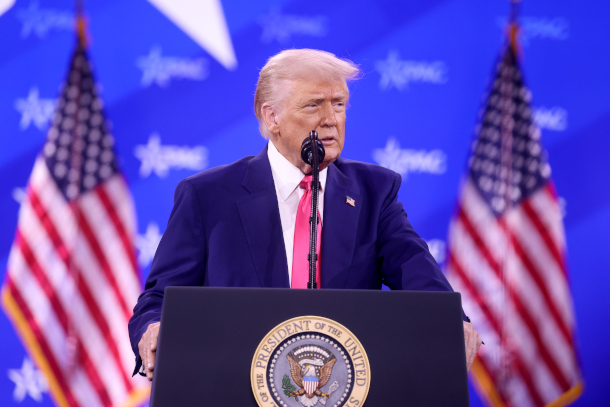
Naomi Oreskes acknowledges that while there have always been questions about the role of science in the federal government, she sees the Trump administration’s rollbacks as an indiscriminate attack on science. (Photo: Gage Skidmore, Flickr, CC BY-SA 2.0)
CURWOOD: Naomi, to what extent is this all about the money?
ORESKES: Yeah, Steve, I get that question all the time, and I really think it's not just about the money. I mean, money is clearly driving a lot of this, and we know that companies like ExxonMobil, Philip Morris Tobacco before them, have been among the most successful, profitable companies in the history of mankind. So money is clearly a huge part of the story, but I actually don't think it's only about money. I think it's also about power and it's about prerogatives. One example I always like to use is seat belts. When the federal government mandated seat belts, the auto industry cried bloody murder, said this will bankrupt us. Customers will never pay for this. Well, here we are, sixty years later. We all have seat belts. Nearly all of us use them. So there's a lot of overreaction by industry to the economic pressure that regulation imposes. So what's really going on there? I think it's about power and prerogative. I think a lot of these business leaders, and I think Musk is a case in point, they think that they should have the right to do whatever they want. And I'd say a generous interpretation would be they think, we have the right to run our businesses as we see fit, and we know better than the government how to run a successful business. That's the charitable interpretation of it. The uncharitable interpretation is, who the heck is the federal government to tell me what to do? And there's a kind of anger that you see in some of the rhetoric, anger at the idea, the very idea that anyone else, whether it's Washington DC, a labor union, consumer activist, that anyone else should have the temerity to tell these people that they don't have the right to do whatever x is, whether it's to dump air pollution in the atmosphere, to exploit children in factories. And we see this, so in the new book, we document how these arguments played out over the course of the 20th century. And it's so interesting to see how the same arguments come up over and over again about defending the right of businessmen. And I use the word men deliberately, because they almost always were, the right of businessmen to run their businesses as they see fit and not have the government telling them what to do.
CURWOOD: So what about the argument that science should just be left to the private sector? I mean, now we have a private company, for example, doing our space exploration.

Modern space exploration was made possible by decades of investment in federal science. (Photo: Scott Andrews, Wikimedia Commons, Public Domain)
ORESKES: Well, I think history proves that that just doesn't work. I mean, yes, the space program is actually a case in point, because we are at a point in history where we can have private space exploration. But what made that possible? Half a century of huge public investment. And if you go back to the early period of the space program, back, you know, right after World War II and into the 50s, there was no private company that was going to take the risk of trying to develop space going missiles. And so there were decades when all of the risk was taken by the federal government here in the United States, later the European Space Agency in Europe, also, obviously, the Russians had a massive and successful space program. So all of that early risk, all the early science and engineering, the technological innovation, was all done by the public sector. And one of the things we know from history, and there's a very excellent book on this, written by Mariana Mazzucato, economist in Britain, called The Entrepreneurial State, where she makes the point that the claim that business people make very often, that they love risk, that they're the bold risk takers, history really shows that is really often not the case, and that in many, many cases, if you look closely, what you see is it's actually the public sector that takes the initial risk, lays the foundation that then makes it possible, subsequently, for the private sector to move in. So without public funding of science and engineering, we would have no space program. And the same is true of the internet. It was the government, or I should say, government scientists, scientists funded by the US federal government, who invented the internet. It was called DARPANET, and it was originally developed as a communications system for the military. All of the initial work for that was done by scientists funded by the federal government. And although Al Gore did not invent the internet, he did sponsor the legislation that made it public and that made it possible for Silicon Valley entrepreneurs to then develop the whole universe of internet applications that we have today, but none of that would exist without public funding.
CURWOOD: What do you think are the consequences of shrinking the role of science in government? I mean, what's at stake?

The foundation for today’s internet was created by government scientists as a communications network for the US military. (Photo: Caio, Pexels, Public domain)
ORESKES: Well, I think many things are at stake, but the two most obvious ones are public health and safety and the natural environment. So many of the federal agencies that we have today, groups like the CDC, Centers for Disease Control, the National Institutes of Health, do scientific work on behalf of human health and safety. And just to give one example, the messenger RNA vaccine that was developed during COVID that is now protecting, I don't know some 250 million Americans or more, that was developed in the private sector, but it was based on research that was largely done at the National Institutes of Health. And if we hadn't had that scientific foundation to build on, there's no way that a vaccine could have been produced in just one year. So I think we would really see the United States lose its leadership in public health and medicine, and I think that that would have very direct consequences in people's lives. The other obvious big area is the natural environment and climate change, and this is a little harder and trickier when we get into climate change, because so much of my work has been about how the science has been ignored. So I can't say that having the science will change things if we've witnessed 30 years of ignoring science, but certainly in many, many areas of environmental protection, having to do with air pollution, water pollution, plastics in the environment, the impact of pesticides, the regulatory structures for protecting people from these dangerous products and activities is based on science. Without science, we wouldn't know that it was DDT that had killed the bald eagles. Without science, we wouldn't know that it's fossil fuels that are driving climate change. I think about this a lot, like, what role does science really play? So imagine there had never been any climate science. We would all realize the climate was changing. I'm speaking to you from Australia, where it's incredibly hot and dry right now, but without science, we wouldn't know why. So science answers the why question and the why question is urgent and essential for the solutions, because if you don't know what's causing a problem, then you can't address the cause, but if you know what the cause is, then you can.
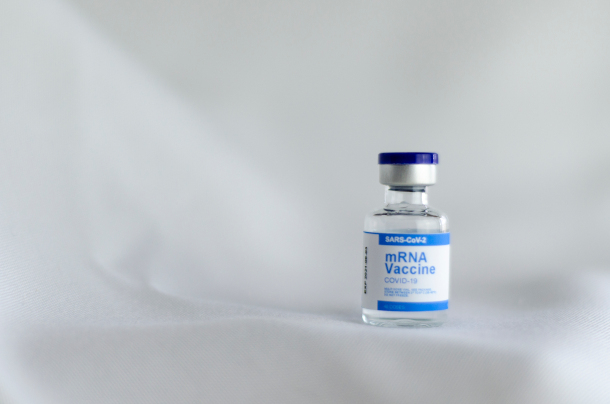
The development of the mRNA COVID-19 vaccine was also supported by federal research. (Photo: Spencerbdavis, via Wikimedia Commons, CC BY 4.0)
CURWOOD: So there's a perception that a large part of the public distrusts science these days. How true is that and how might we reinstill trust in science?
ORESKES: Well, I'm glad you asked that question, because actually there's a little bit of good news here. There have been many polls, the Pew Research Foundation are particularly good on this, but there are other polls as well, and these polls consistently show that the vast majority of Americans, something like 70% still have a high level of trust in science, and scientists, still think that science as a whole, as an enterprise, makes our lives better, and believes that the federal government should support research in both science and technology. So what's that famous line about rumors of my death are premature? The rumors of the death of science or the end of science are definitely premature. And I think it's really important here not to overreact, because we don't want to be estranging ourselves from a public that, in fact, largely supports us. But I do think that two things, in any area of life, you don't want to take trust for granted, and so it is really important for the scientific community to continue to think about what kinds of activities can we be engaged with to help maintain and expand that trust, whether it's public education, support for informal education through museums or aquaria, or just individual scientists going to schools and churches and synagogues. I think a lot of scientists still feel like that's not my job. I don't have time for that. And I think that the last few years have really shown us we have to make time for that kind of work, and we have to consider it part of our job, because when we don't, we do risk losing the trust of significant numbers of our fellow citizens. And this is the really key part, even if 70% of Americans trust science and want the government to fund it, 30% who don't is still very significant, because if those 30% are unvaccinated, or even if 10% are unvaccinated, then we begin to see what we're already seeing in Texas. No one should have measles in the 21st century. And yet, we have seen people now dying of measles, a completely preventable disease, because they don't trust the vaccine. And so even if the percentage who reject science are small, those small percentages can have very serious, in some cases, even deadly impacts.
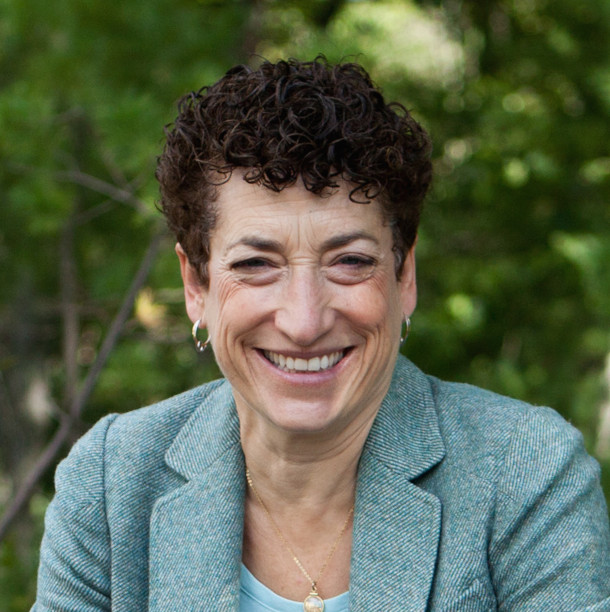
Naomi Oreskes is a professor in the History of Science Department at Harvard University. (Photo: Kayana Szymczak)
CURWOOD: What's going to be the international impact of the US government being so hard on science, both blocking the results and the information coming from science when it comes to stuff like the climate and toxics, but also in terms of educating the next generation of scientists?
ORESKES: Well, that's a great question, and in a way, there's a bit of a silver lining here, because there are great and talented scientists all across the world doing important work. So you know, if the United States creates a vacuum, other countries will step up to fill it, and I think science as a whole will continue. I don't think the scientific enterprise will collapse just because the United States withdraws or lessens its commitment. But at the same time, I don't want to just say it'll all be fine for that reason, because the United States has played a really crucial role, particularly in terms of data sharing, especially satellite data, but also in climate change, helping to run the Model Intercomparison project at Lawrence Livermore National Laboratory. The United States has really been a leader in terms of data collection, data curation and data sharing, and that's crucially important for the advance of scientific understanding. So I think there's no question that if we abdicate responsibility, other people will step up to the plate, but it will take time before they can really make up for the losses that the United States is now creating.
CURWOOD: Naomi, what can you give us in the way of hope? To what extent can we learn from the past?
ORESKES: Well, I wouldn't be a historian if I didn't think we could learn from the past, and I certainly wouldn't be a professor if I didn't think we could learn from the past. I think one of the key things that the history of science and the federal government shows is how repeatedly, over the course of the history of this nation, people have recognized the need for science in many diverse ways, and whenever people have pushed back and said, oh no, we don't need it, it's not a federal function, the side that won the argument was, yes, we do need it, and it is a federal function. And I just had the opportunity here in Australia to share a stage with Kumi Naidoo from South Africa, who's an amazing, inspiring speaker. And one of the things he said a few days ago was, pessimism is a luxury that we do not have, and I like that. You know, there's a lot of reasons to be frustrated right now, but at the same time, there's also a lot of work to be done. And so I guess my grounds for hope is sort of simply that we have to work. We have to get back to work, and when we face problems, Americans are actually very good at rolling up our sleeves and getting to work. And so I guess I have some degree of optimism in Americans' appetite for hard work, Americans appetite for challenge, and to know that, you know, we've been through tough periods before, and we will get through this tough period as well, I think, I hope.
CURWOOD: Naomi Oreskes is a professor of the history of science at Harvard University. Thanks so much for taking the time with us today.
ORESKES: You're welcome. It's been a pleasure.
Links
Read 1900 Researchers’ Open Letter to the American People
The New York Times | “What We Know About Cuts to the Federal Work Force”
Living on Earth wants to hear from you!
Living on Earth
62 Calef Highway, Suite 212
Lee, NH 03861
Telephone: 617-287-4121
E-mail: comments@loe.org
Newsletter [Click here]
Donate to Living on Earth!
Living on Earth is an independent media program and relies entirely on contributions from listeners and institutions supporting public service. Please donate now to preserve an independent environmental voice.
NewsletterLiving on Earth offers a weekly delivery of the show's rundown to your mailbox. Sign up for our newsletter today!
 Sailors For The Sea: Be the change you want to sea.
Sailors For The Sea: Be the change you want to sea.
 The Grantham Foundation for the Protection of the Environment: Committed to protecting and improving the health of the global environment.
The Grantham Foundation for the Protection of the Environment: Committed to protecting and improving the health of the global environment.
 Contribute to Living on Earth and receive, as our gift to you, an archival print of one of Mark Seth Lender's extraordinary wildlife photographs. Follow the link to see Mark's current collection of photographs.
Contribute to Living on Earth and receive, as our gift to you, an archival print of one of Mark Seth Lender's extraordinary wildlife photographs. Follow the link to see Mark's current collection of photographs.
 Buy a signed copy of Mark Seth Lender's book Smeagull the Seagull & support Living on Earth
Buy a signed copy of Mark Seth Lender's book Smeagull the Seagull & support Living on Earth

